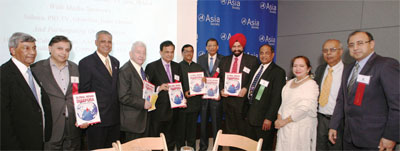
NEW YORK (TIP): Former Goldman Sachs Group Inc. director Rajat Gupta said his insider-trading conviction should be thrown out because prosecutors failed to prove their case under a sweeping appeals court ruling last year, says a Bloomberg report.
Now serving a two-year prison sentence for insider trading, Gupta claimed the government didn’t show he got a personal benefit for passing tips to billionaire friend Raj Rajaratnam. Prosecutors must prove that element, the U.S. Court of Appeals in New York ruled in December, in a blow to a series of cases won by Manhattan U.S. Attorney Preet Bharara.
Gupta, 66, also a former McKinsey & Co. managing partner, is the highest-profile executive convicted in the U.S. crackdown on insider trading at hedge funds and lost earlier bids to reverse the 2012 verdict.
Jurors convicted “Gupta without finding that his tips were part of an agreed-upon exchange of tips for consequential benefits,” defense lawyer Gary Naftalis said Thursday in a filing seeking to have the conviction tossed out and Gupta freed from prison.
Gupta was convicted of passing tips to Rajaratnam, co-founder of Galleon Group LLC, about Berkshire Hathaway Inc.’s $5 billion investment in Goldman Sachs and the bank’s financial results for two quarters in 2008.
Gupta surrendered in June to a federal prison in Massachusetts. He’s scheduled to be released in March 2016. Rajaratnam, 57, is serving an 11-year sentence in the same facility for masterminding a multimillion-dollar insider scheme.
Prior Relationship
Prosecutors argued at the trial that Rajaratnam had a prior business relationship with Gupta and had promised to name Gupta chairman of a new Galleon fund. U.S. District Judge Jed Rakoff, who presided over the case, told jurors that the benefit Gupta received didn’t need to be financial but could include “a good relationship with a frequent business partner” or “future financial benefits.”
That standard is “now invalid,” Naftalis wrote in the new filing with Rakoff. “Merely showing that a tipper and tippee maintained a mutually-beneficial personal relationship” isn’t enough to convict, he said.
Naftalis said Gupta never profited and that $10 million he invested with Rajaratnam was wiped out in the 2008 financial crisis. He cited the testimony of Ajit Jain, Berkshire Hathaway’s reinsurance chief and a close friend, who said that Gupta told him during a 2009 luncheon that Rajaratnam had “swindled or cheated” him.
The appeals court ruling means that what Gupta did is no longer considered a crime, Naftalis said. Forcing Gupta to remain behind bars means he’ll be imprisoned “for an act that the law does not make criminal,” he said.
Jennifer Queliz, a spokeswoman for Bharara, declined to comment on Gupta’s request.





Be the first to comment